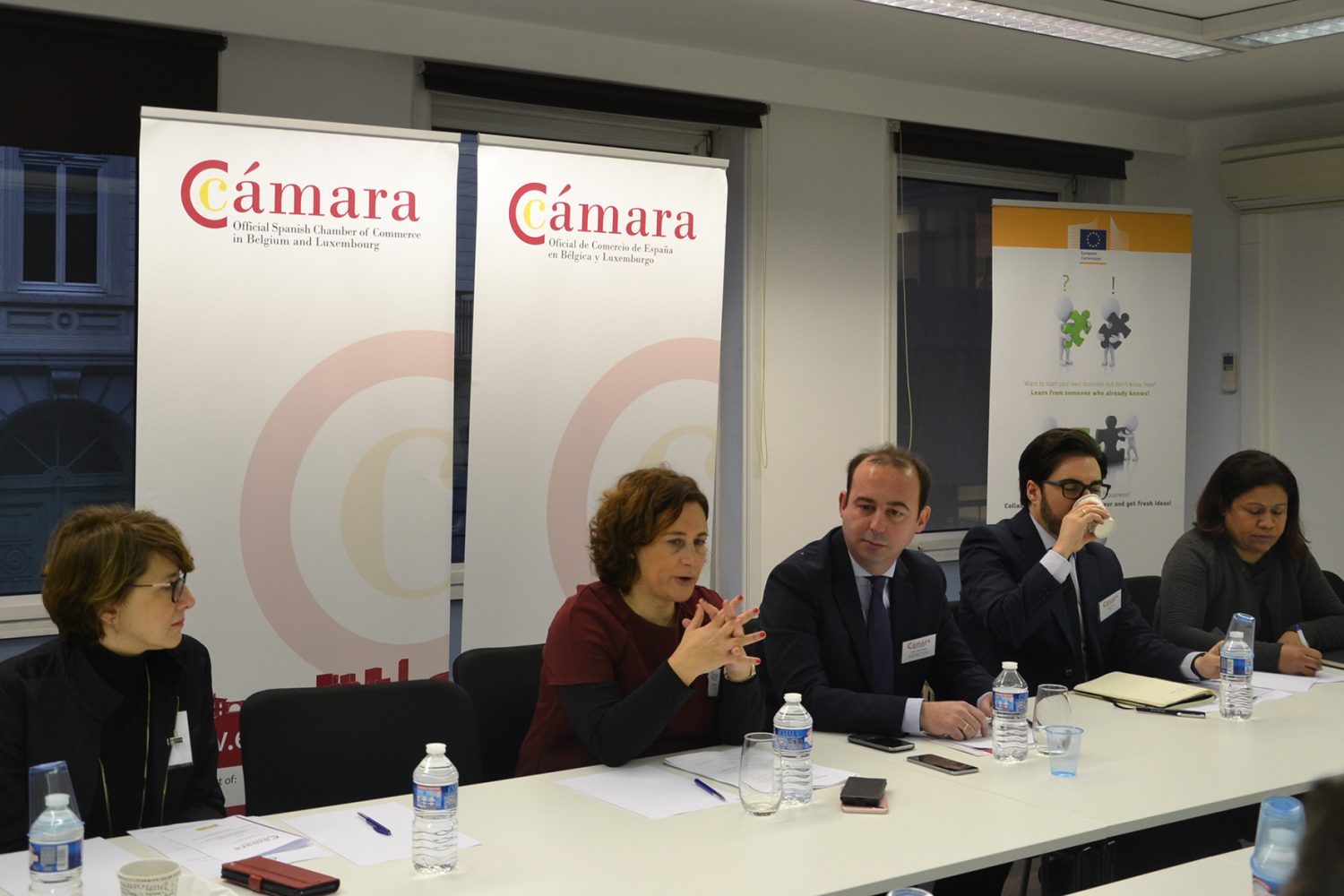Luncheon-Debate with Jyrki Katainen
On March 7, the Official Spanish Chamber of Commerce in Belgium and Luxembourg organized a luncheon-debate hosting Jyrki Katainen, Vice-President of the European Commission for Jobs, Growth, Investment and Competitiveness about “The future of Europe”. The event had the participation of CEOs of international companies, members of the Chamber and representatives of Spanish and European public bodies.
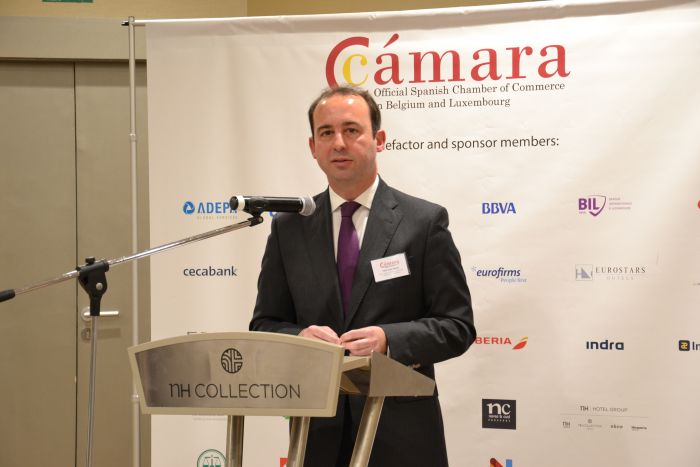 The presentation was given by Pablo López Álvarez, Vice-President of the Chamber, who reviewed the professional career of Jyrki Katainen and expressed the satisfaction that it is for the Chamber to organize this type of luncheon with guests of recognized prestige such as the Commissioner.
The presentation was given by Pablo López Álvarez, Vice-President of the Chamber, who reviewed the professional career of Jyrki Katainen and expressed the satisfaction that it is for the Chamber to organize this type of luncheon with guests of recognized prestige such as the Commissioner.
Hereafter Katainen took the floor, from the beginning he transmitted a motivational and of change message with his speech.
The Vice President proposed three main areas to expose the future situation of Europe.
The first one refers to a more integrated European Union: member countries, businesses and European citizens will make a more united Europe in a few years. Regulatory measures, many of which have already been or are being implemented, will give way to a Europe with new markets that will create new business opportunities such as in the plastics industry and its future transformation.
As a second area, he referred to the challenges coming from outside the European Union, where he highlighted three key powers: the United States and its conception of the market that is far from the open market vision of the EU; China, and the problems linked to the non-opening of its market to European investment, and finally, Russia. In line with the external relations of the EU, Katainen invited attendees to reflect on whether we are strong enough to act in defense of the EU.
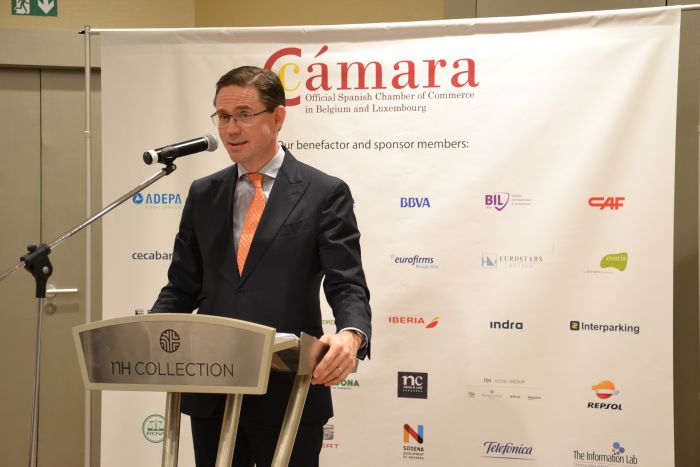 In the third and final field concerning the future of Europe, the internal challenges faced by the EU itself and the crises associated with the fundamental values of the European project were highlighted.
In the third and final field concerning the future of Europe, the internal challenges faced by the EU itself and the crises associated with the fundamental values of the European project were highlighted.
Jyrki Katainen ended his speech by referring to the role played by Spain in the EU, considering it a good ally as a European partner. The Vice President expressed his wish that Spain take a step forward in fundamental aspects such as the national market integration, the single internal market or development. He highlighted the history of the country in terms of the struggle for its internal security, and the prominent role that Spain could have in leading the debate on the defense of the EU.
To conclude, Katainen stressed the common goal that must be worked towards the future: to achieve a more competitive and integrated Europe.
After the presentation, a round of questions began where participants could raise their different concerns about the future of Europe. During the debate, topics such as the single internal market, circular economy, Artificial Intelligence, defense and security of the EU were discussed.
From the Chamber we want to show our gratitude to Bodegas Abadal, whose wines could be tasted by all attendees, and to participants for this successful luncheon-debate.

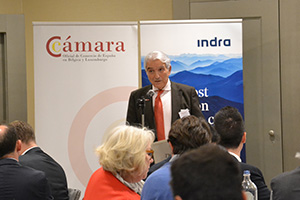 The presentation was given by Juan Rodríguez Villa-Matons, President of the Chamber, who reviewed the professional career of Violeta Bulc and showed the satisfaction that it is for the Chamber to organize this type of luncheon with guests of the category of the Commissioner in collaboration of Spanish well-known companies, through which the Chamber is able to keep on growing.
The presentation was given by Juan Rodríguez Villa-Matons, President of the Chamber, who reviewed the professional career of Violeta Bulc and showed the satisfaction that it is for the Chamber to organize this type of luncheon with guests of the category of the Commissioner in collaboration of Spanish well-known companies, through which the Chamber is able to keep on growing.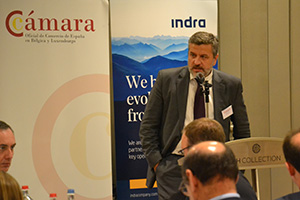 For her part, Commissioner Violeta Bulc conveyed a motivating and changing message with her speech. Bulc started by explaining the current evolution in the transport sector and the need to exchange not only good practices but opinions and ideas to promote awareness and collaboration to direct actions towards a common goal.
For her part, Commissioner Violeta Bulc conveyed a motivating and changing message with her speech. Bulc started by explaining the current evolution in the transport sector and the need to exchange not only good practices but opinions and ideas to promote awareness and collaboration to direct actions towards a common goal.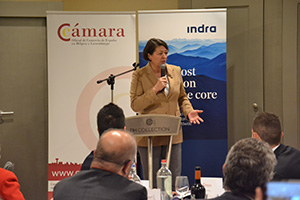 The rest of the exposition revolved around two axes; on the one hand, decarbonisation and on the other the digitalization of transport. With regard to decarbonisation, it was mentioned low emission vehicles to achieve clean mobility, highlighting in turn the relevance of alternatives to current fuels and infrastructures.
The rest of the exposition revolved around two axes; on the one hand, decarbonisation and on the other the digitalization of transport. With regard to decarbonisation, it was mentioned low emission vehicles to achieve clean mobility, highlighting in turn the relevance of alternatives to current fuels and infrastructures.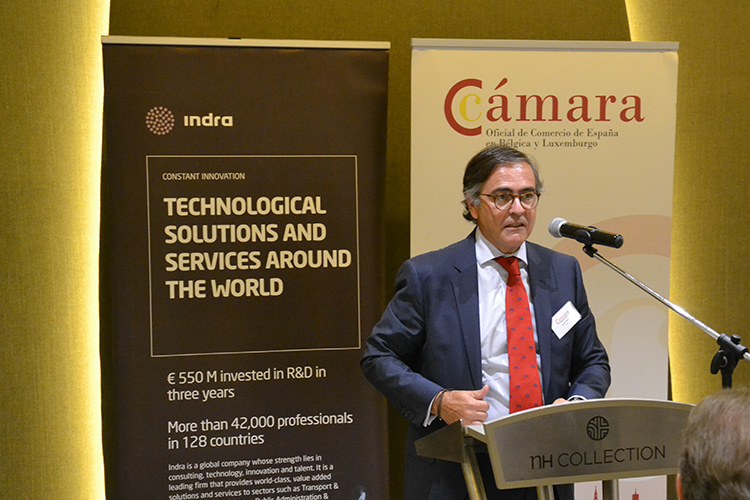
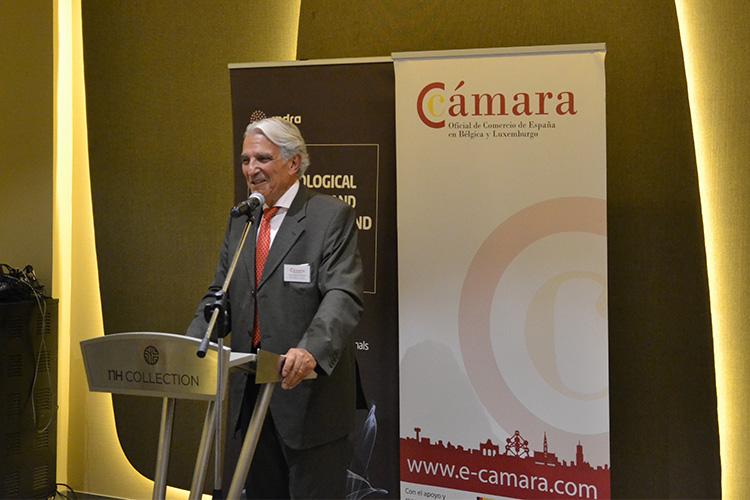
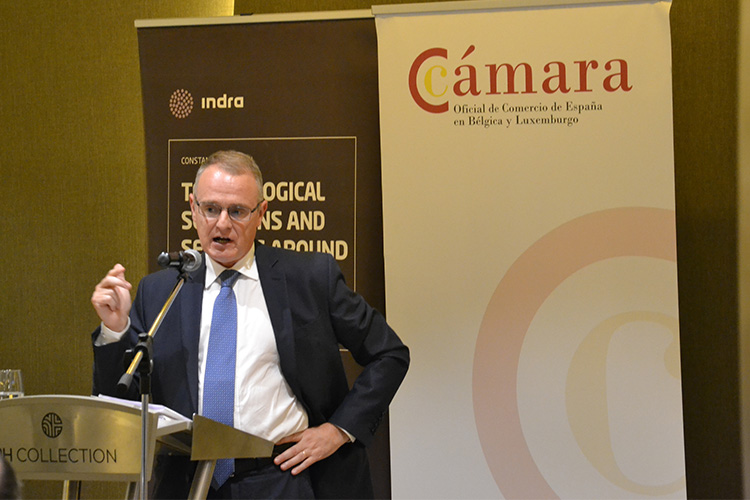
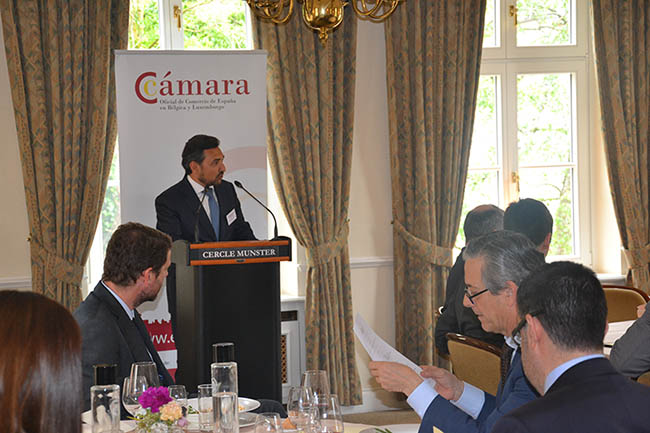
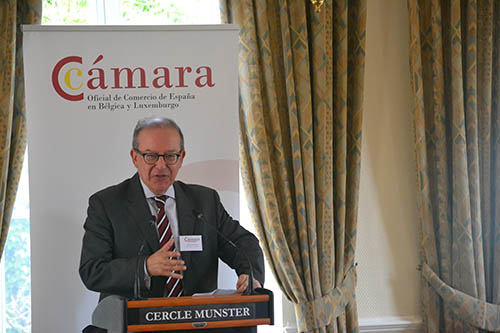
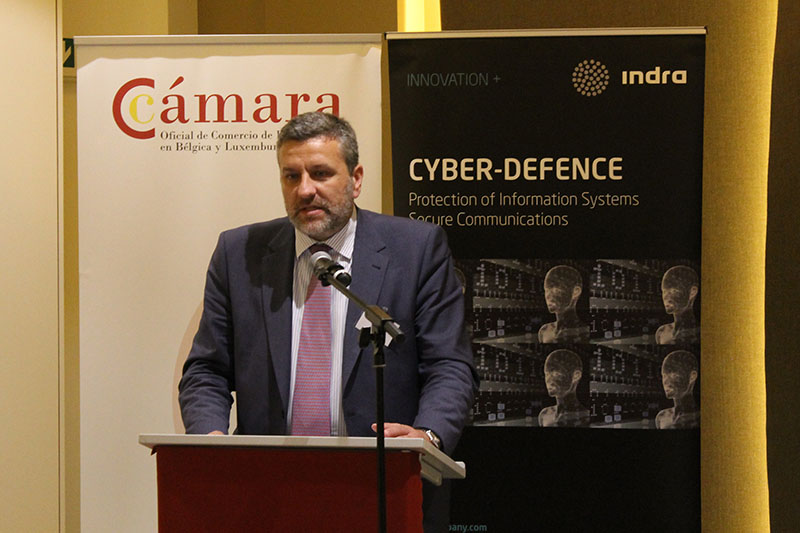 David Luengo, the director of Indra office in Brussels, was in charge of the presentation. He expressed the concerns of the company to face the new global challenges and thanked the speaker for his effective work in his different responsibilities through the years in Brussels. Juan Rodríguez Villa-Matons, the President of the Chamber, expressed his satisfaction about being able to count on an experienced diplomat as Nicolás Pascual de la Parte. As for the speaker, he reminded having taken part in previous events organized by the Chamber and reminded that he was willing to take part to future events.
David Luengo, the director of Indra office in Brussels, was in charge of the presentation. He expressed the concerns of the company to face the new global challenges and thanked the speaker for his effective work in his different responsibilities through the years in Brussels. Juan Rodríguez Villa-Matons, the President of the Chamber, expressed his satisfaction about being able to count on an experienced diplomat as Nicolás Pascual de la Parte. As for the speaker, he reminded having taken part in previous events organized by the Chamber and reminded that he was willing to take part to future events.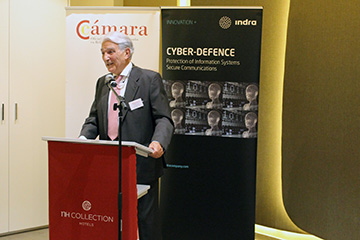
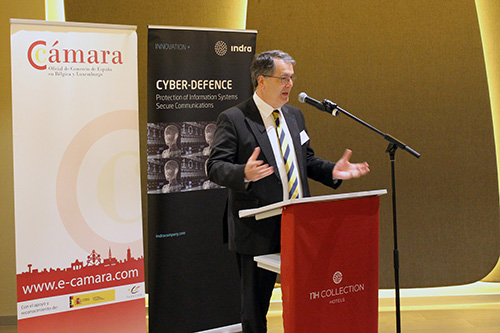

 Regarding competition policies, he expressed the will to continue along the same lines, adapting to the new technologies and economies, such as ITC, IT and e-commerce. Regulations need to go hand in hand with the changes in the market and the economy, so the justice is done in a way that is fair to all parties.
Regarding competition policies, he expressed the will to continue along the same lines, adapting to the new technologies and economies, such as ITC, IT and e-commerce. Regulations need to go hand in hand with the changes in the market and the economy, so the justice is done in a way that is fair to all parties.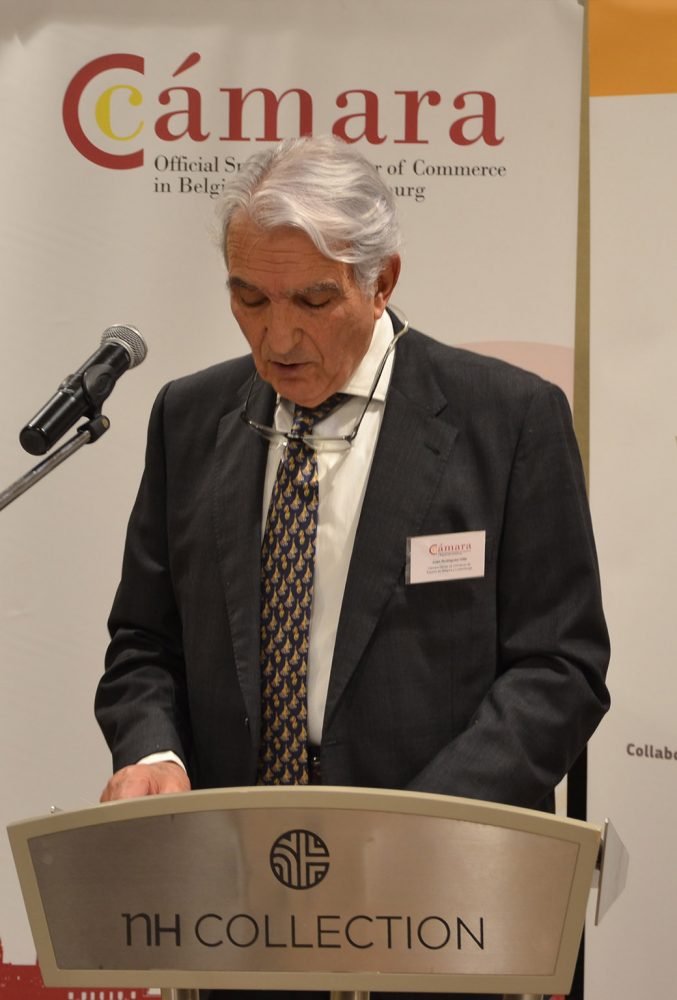 The President of the Chamber Juan Rodríguez-Villa Matons reviewed the career path of the Commissioner and thanked for his participation in the event, as well as his interest for the Spanish economy.
The President of the Chamber Juan Rodríguez-Villa Matons reviewed the career path of the Commissioner and thanked for his participation in the event, as well as his interest for the Spanish economy.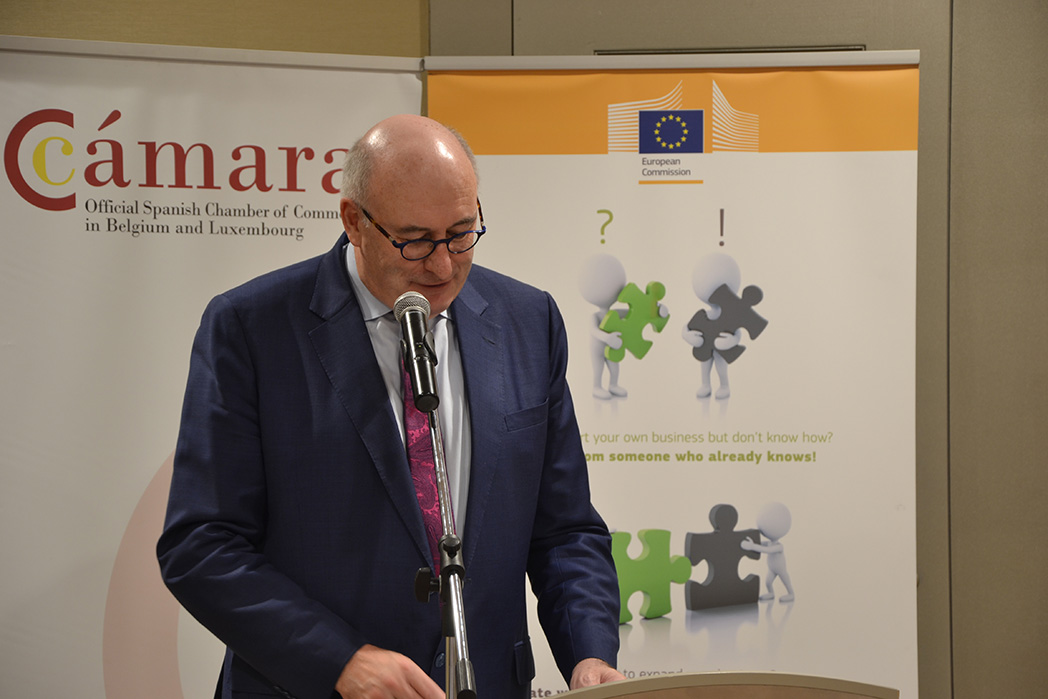
 Juan Rodríguez-Villa Matons, President of the Spanish Chamber of Commerce in Belgium and Luxembourg pronounced some welcome words and introduced the speaker, bringing to light his recognized professional career.
Juan Rodríguez-Villa Matons, President of the Spanish Chamber of Commerce in Belgium and Luxembourg pronounced some welcome words and introduced the speaker, bringing to light his recognized professional career. r issue which have to be taken into account is how the Common Agricultural Policy of the EU will be administrated, since Spain is one of the main beneficiaries of such funds, and so negotiations will be necessary to meet the best conditions.
r issue which have to be taken into account is how the Common Agricultural Policy of the EU will be administrated, since Spain is one of the main beneficiaries of such funds, and so negotiations will be necessary to meet the best conditions.
